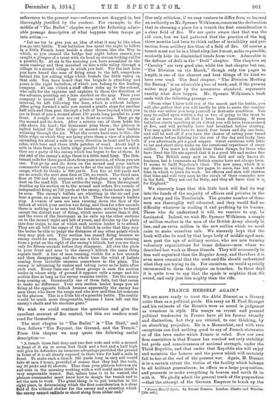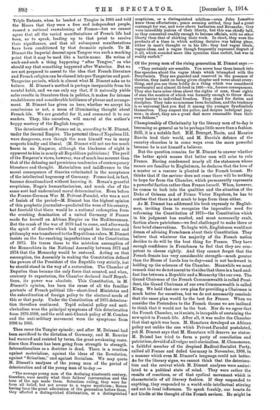FRANCE HERSELF AGAIN.*
WE are more ready to trust the Abbe Dimnet as a literary critic than as a political guide. His essay on M. Paul Bourget and his estimate of the Brontes were as sound in judgment as vivacious in style. His essays on recent and present political tendencies in France have all his former vivacity and distinction, but they are vitiated, to our thinking, by an absorbing prejudice. He is a Monarchist, and with rare exceptions can find nothing good to say of French statesmen or of the laws under which France is ruled. Now our own firm conviction is that France has reached not only stability; but pride and consciousness of national strength, under the Third Republic, and that under that Republic she will enjoj, and maintain the honour and the power which will certainly fall to her at the end of the present war. Again, M. Dimnet is to a certain extent the victim of the facility which belOnge to all brilliant generalizers; he offers ns a large proposition; and proceeds to make everything in heaven and earth fit in with it. We gladly admit the general truth of the proposition- -that the attempt of the German Emperor to break Up the
• Prance Hemel elgain. By Ernest Dimnet, London: Chatto and Windusi [16s. net.]
Triple Entente, when be landed at Tangier in 1905 and told the Moors that they were a free and independent people, caused a national reawakening of France—but we cannot agree that all the varied manifestations of French life bad been, so to speak, leading up to that point to receive their significance, and that all subsequent manifestations have been conditioned by that dramatic episode. To M. Dimnet the Imperial descent upon Tangier was such a marking point that it may be used like a battle-name. He writes of such-and-such a thing happening "after Tangier," as who should say that something happened after Waterloo. But we are not prepared to assent to the idea that French literature and French religion can be classed into pre-Tangerine and post- 'Tangerine periods, which is almost what M. Dimnet asks us to believe. M. Dimnet's method is perhaps inseparable from his mental habit, and we can only say that, if it naturally yields safer results in literature than in politics, it makes for intense readableness and considerable brilliance of phrase and arrange- ment. M. Dimnet has given us here, whether we accept his conclusions or not, a mass of illuminating thought about French life. We are grateful for it, and commend it to our readers. They, like ourselves, will marvel at the author's happy mastery of the English tongue.
The deterioration of France set in, according to M. Dimnet, under the Second Empire. The personal ideas of Napoleon III. were dangerous, even though the man himself was in many respects kindly and liberal. (M. Dimnet will not see too much 'harm in an Emperor, although the blackness of night is apparent to him in nearly all Republican politicians.) The peril of the Emperor's views, however, was of much less account than that of the debasing and pernicious tendencies of contemporary literature and thought. Materialism and indifference to the moral consequence of theories culminated in the acceptance of the intellectual hegemony of Germany. France bad, in fact, become denationalized without knowing it. Renan's graceful scepticism, Hugo's humanitarianism, and much else of the same sort had undermined moral determination. Even before the Franco-German War M. Prevost-Paradol, who was a sort of Isaiah of the period—M. Dimnet has the highest opinion of this prophetic journalist—predicted the woes of his country, but foretold that there would be a national redemption from the crushing domination of a united Germany if France made for herself an African Empire on the Mediterranean. But the crash of the war of 1870 had to come, and afterwards the spirit of disorder which had reigned in literature and philosophy was transferred to the Republican rulers. M. Dimnet insists on the far-reaching imperfections of the Constitution of 1875. He traces these to the mistaken assumption of the Monarchists in the National Assembly between 1871 and 1874 that the Monarchy would be restored. Acting on that assumption, the Assembly in making the Constitution defined the powers of the President of the Republic very strictly, lest he should stand in the way of a restoration. The Chamber of
Deputies thus became the only force that counted, and when, contrary to expectation, the Chamber declared itself Repub- lican, its power was absolute. This Constitution, in M. Dimnet's opinion, has been the cause of all the familiar portents of French political life—short-lived Ministries and the subordination of foreign policy to the electoral needs of this or that party. Under the Constitution of 1875 deteriora- tion therefore continued. Tepid colonial policy and anti- clericalism were the principal symptoms of this deterioration from 1876-1898, and the arid anti-Church policy of M. Combes and the anti-military movement were the symptoms from 1898 to 1905.
Then came the Tangier episode ; and after M. Delcasse had been sacrificed to the dictation of Germany, and M. Bouvier had wavered and resisted by turns, the great awakening came. Since then France has been going from strength to strength. Internationalism as a doctrine is dead. There is a reaction against materialism, against the ideas of the Revolution, against "Scientism," and against Socialism. We may quote M. Dimnet's analyses of the young man of the period of deterioration and of the young man of to-day :—
"The average young men of the declining nineteenth century, therefore, were mostly what their fathers' conversation and the tone of the ago made them. Scientism ruling, they were far from all belief, but not averse to a vague mysticism • Renan
having been the '
great admiration of the generation before them, they affected a distinguished dilettantiiim, or a distinguished scepticism, or a distinguished nihilism—even Jules Lemaitre knew these affectations; peace seeming settled, they had a great contempt for war, and were above barbarism and Revanche ; they were incredibly jealous of their liberty, but this was chiefly talk, as they consented readily enough to become officials, with no other liberty than that of shirking their work. In short, they were the products of a time in which nothing decisive was taking place, either in man's thought or in his life : they had vague ideals, vague ideas, and a vague though frequently expressed disgust of it all, which sounded more like cynicism than surfeit, but was in reality surfeit."
Of the young men of the rising generation M. Dimnet says :—
"They certainly are sensible. You never hear them launch into fine speeches about the vague ideals which triumphed with the Dreyfusists. They are guarded and reserved in the presence of theories, they insist on being given chapter and verse about every- thing, and you see them boldly do a thing which was considered uneducated and almost ill-bred in 1895—viz., foresee consequences. They also have sober ideas about the rights of man, those rights of man the mention of which was formerly enough to throw down every barrier to individual freedom. They stand for duties and discipline. They take no nonsense from Socialism, and the tendency is so universal that you find it among the younger Syndicalists themselves. They respect the police, and despise indulgent jury- men ; in short, they are a great deal more reasonable than their own fathers."
Championship of Christianity by the literary men of to-day is becoming so general as to be perhaps little more than a fashion. Still, it is a notable fact. MM. Bourget, Basin, and Maurice Herres lead their world, and M. Barrel's defence of the country churches is in some ways even the more powerful because be is not himself a believer.
But the question remains for M. Dimnet to answer whether the better spirit means that better men will arise to rule France. Having condemned nearly all the statesmen whose names are familiar to Englishmen, he declares that the love of a master or a rescuer is planted in the French breast. He thinks that if the saviour does not come there will be nothing to hope for from the Chamber, which permanently represents a powerful faction rather than France herself. When, however, he comes to look into the qualities and the situation of the Duke of Orleans and of Prince Victor Napoleon, he has to confess that there is not much to hope from them either.
As M. Dimnet has addressed his book expressly to English- men, inviting them to recognize the imperative need for reforming the Constitution of 1875—the Constitution which in his judgment has exalted, and must necessarily exalt, faction above patriotism—we feel challenged to make three or four brief observations. To begin with, Englishmen would not dream of advising Frenchmen about their Constitution. They believe that whatever the majority of the French nation decides to do will be the best thing for France. They have enough confidence in Frenchmen to feel that they are com- petent to choose rightly. And they cannot forget that the French Senate has very considerable strength—much greater than the House of Lords has to-day—and is not backward in holding up the schemes of the Chamber. Meanwhile we must remark that we do not assent to the idea that there is a hard-and- fast line between a Republic and a Monarchy like our own. The Grand Chairman of the French Commonwealth is called Presi- dent, the Grand Chairman of our own Commonwealth is called King. We hold that our own plan for providing a Chairman is much better for ourselves, but we do not necessarily conclude that the same plan would be the best for France. When we consider the Pretenders to the French throne we are inclined to think that it would not be the best. Nor do we agree that the French Chamber, as it exists, is incapable of sustaining the new spirit in French life. After all, it was under the Chamber that that spirit was born. M. Hanotaux developed an African policy not unlike the one which Prevost-Paradol postulated, yet M. Dimnet says that M. Hanotaux will deserve no statue. M. Briand has tried to form a party of conciliation and patriotism, devoid of all vulgar anti-clericalism. M. Clemencean, a faithful member of the despised Radical-Socialist Party, rallied all France and defied Germany in November, 1909, in a manner which even M. Dimnet's language could not better.
As for the literary signs, we cannot think that the deteriora- tion and the revival which M. Dimnet analyses were assimi- lated to a political state of mind. - They were rather the results of reactions, or of that cyclical movement which is characteristic of all literary fashion. if they responded to anything, they responded to a world-wide intellectual stirring and not to local influences. To speak frankly, our hearts do not kindle at the thought of the French saviour. He might be only Le Desire over again, or a Louis Philippe favouring the rich bourgeoisie at the expense of everybody else. The nation that is fighting the Germans with a coolness and a determina- tion never known before is the nation that has accepted the Third Republic and the Constitution of 1875. If that Con- stitution is imperfect, the same nation, acting in the same spirit, is able to improve it.




























































 Previous page
Previous page